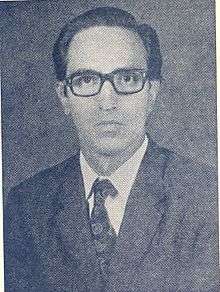Waheed Akhtar
| Urdu Poet and Muslim Philosopher Syed Waheed Akhtar | |
|---|---|
 Waheed Akhtar | |
| Title | Waheed |
| Born | 12 August 1934 |
| Era | contemporary |
| Region | India |
| Religion | Islam |
| Notable work(s) | Paththaron Ka Mughanni, Shab Ka Razmiyah, Zanjeer ka Naghma, Karbala Ta Karbala, Early Imamiyah Shia Thinkers, etc |
| Signature |
 |
Syed Waheed Akhtar (Urdu: سید وحید اختر ) (12 August 1934 in Aurangabad (Deccan) – 13 December 1996) was an Urdu poet, writer, critic, orator, and a Muslim scholar and philosopher.
Life
Waheed Akhtar was born in Aurangabad in what was then the Hyderabad State of Nizam (present day Maharashtra), to a family which had migrated from Jais, the birthplace of poet Malik Muhammad Jayasi), in the district of Uttar Pradesh.
His father was Syed Nazr-e Abbas and his mother was Syeda Aliya Begum. They had seven children. Waheed Akhtar was the second child among six sons and one daughter. After spending his childhood in Aurangabad, and completing his early education, he went to Hyderabad to enroll at Osmania University.
He was in Hyderabad for eight years until he completed his PhD and was then appointed lecturer at Aligarh Muslim University. It is thought that his years in Hyderabad were crucial for moulding his personality as a poet and writer.
Waheed Akhtar wrote prolifically in Urdu from a very early age and during his initial years he adopted the pen name "Barq". He married Syeda Mahliqa Qarai in Hyderabad in 1962. They had four sons: Hasan, Husain, Haider (who died in the fifth month of his birth) and Mohsin.
Works
According to Shamsur Rahman Faruqi, "Wahid Akhtar, regarded by many as a Modernist and by many others as Progressive, wrote that Modernism was really an extension of Progressivism".[1] Akhtar is also considered by at least one writer to be among the few successful modern Urdu poets who took Marsia to new heights and gave it new direction this age.[2]
Poetry: ghazals and nazms
His following collections of poetry consist mostly of nazms and ghazals
- Patthron Ka Mughanni
- Shab Ka Razmiyyah
- Zanjir Ka Naghma
Marsia
Karbala Ta Karbala (collection of Elegies on martyrs of Karbala– Urdu) –1991- consists of eight marasi (plural of marsia)
- Mariam se bhi siwa hai fazilat Batul ki: Chadar-e-Tatheer, Marsia on Hazrat Fatima, has 168 bunds.
- Qale tameer kiye daste havaskari ne: Qala Kusha, Marsia on Hazrat Ali ibne Abi Talib-135 bunds in total.
- Barsi nahi naghmon ki ghatayen kai din se: Shaheed-e-Atash, Marsia Hazrat Ali Asghar ibn al-Husain-107 bunds.
- Ai saqi e hayat o masiha e kainat: Alamdar-e-Amn, Marsia on Hazrat Abul Fazl al-Abbas, 134 bunds in toal.
- Hai qafila e jara'at e raftar safar mein: Salaar-e-Qafila-e-Shauq, Saiyid al-Shohada Hazrat Imam Husain ibne Ali, 143 bunds.
- Raat yeh haq ke chiraghon pe bahot bhari hai: Tegh-e-Zaban e Zainab, Marsia Hazrat Zainab, 188 bunds in all.
- Ya Rabmeri zuban ko qudrat bayan ki de: Shahadat-e-Nutq, marsia Ali Akbar ibn al-Husain, 192 bunds.
- Karbala! ai Karbala! Ai Karbala! ai Karbala!: Karbala ai Karbala, marsia matlooban-e-shahadat (Zuhayr ibne Qayn, Habeeb ibne Mazahir, Hur ibne Yazid Riyahee and Musayyab khuzayee), 191 bunds.
Prose
His writings in prose are literary criticism, philosophical writings, book reviews, columns and talks. Collection of his writings in Urdu prose have been published by National Council for Promotion of Urdu Language http://www.urducouncil.nic.in/ in six volumes as Kulliyat-e-Waheed Akhtar which is edited and compiled by Sarwarul Huda. Three volumes have already been published and the other three remain to be published.
Published books
Prose
- Khwaja Mir Dard-Tasawwuf aur Shairi; published by Anjuman Tarraqi-e-Urdu Hind–1971
- Falsafa aur Adabi Tanqid (Literary Criticism in Urdu) – 1972
Translations
- Four quartets by T. S. Eliot (Burnt Norton), Urdu Adab, Aligarh, and Shabkhoon, Allahbad.
- Julius Caesar by William Shakespeare. AIR, Hyderabad.
- Letter on Aesthetics by Schiller.
- Mutual Services of Islam and Iran, by Murtada Motahhari, (Published in instalments in Al-Tawhid, Tehran).
Foreign assignment
Editor of Al-Tawhid (English) a journal of philosophy and culture, Islamic Propagation Organization, Tehran, Iran – May 1984-April 1987.
See also
- Urdu poetry
- Mir Babar Ali Anis
- Karbala Ta Karbala
References
External links
- a brief portrayal of Waheed Akhtar by his friend Awaz Sayeed from Hyderabad.
- Lineage of al-Radi and his Life
- Sources of Nahj al Balaghah
- The Contents of Nahj al Balaghah
- The Commentaries on Nahj al Balaghah
- Misconceptions about Nahj al Balaghah
- Right to Acquire Knowledge: Nahj al-Balaghah's Approach
- Freedom, Human Destiny, and the World in the Nahj al-Balaghah
- The Concept of Freedom in the Nahj al-Balaghah
- Taken from "The Early Imamiyah Shi'ite Thinkers"-discusses Kulayni's work and contribution.
- Freedom in the Islamic Framework of Human Rights, With Special Reference to the Nahj al-Balaghah
- Al-Tawhid
- Karbala', an Enduring Paradigm of Islamic Revivalism
- The Islamic Concept of Knowledge
- An Introduction to Imamiyyah Scholars Major Shi'i Thinkers of the Fifth/Eleventh Century
- Islam and Iran: A Historical Study of Mutual Services
- Alleged Book Burnings in Iran and Egypt: A Study of Related Facts and Fiction
- Western Nationalism and Islamic Nationhood
- Book Review: Modern Political Islamic Thought
- A Review Article by Dr. Waheed Akhtar on 'Occidentosis: A Plague From the West' by Jalal Ale Ahmad-translated by . R. Campbell; edited by Hamid Algar
- Prof. Waheed Akhtar in a Mushairah at Muscat in 1994 part I on YouTube
- Mushairah - Dr. Waheed Akhtar, part II on YouTube
- Reliving Karbala Martyrdom in South Asian Memory By Syed Akbar Hyder, Inc NetLibrary
- - Indian Muslim Philosopher Commemorated
- - Late Indian Muslim philosopher commemorated in one-day seminar
- Late Indian Muslim philosopher commemorated in one-day seminar
- Urdu Poetry-Mushaira
- Poetry by Waheed Akhtar
|